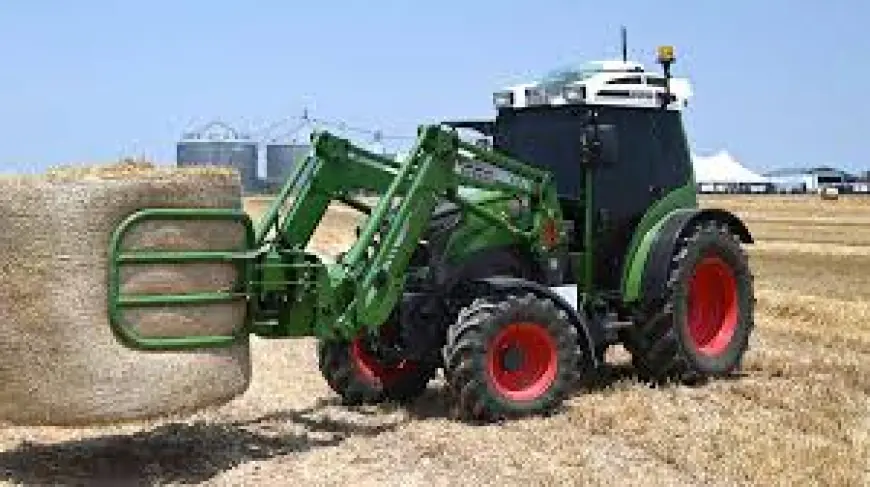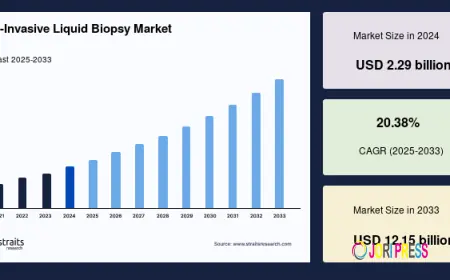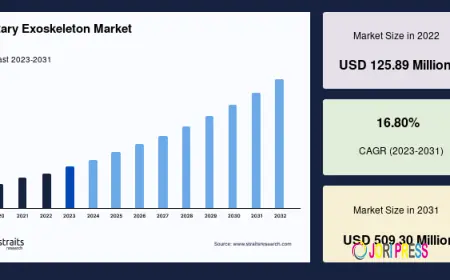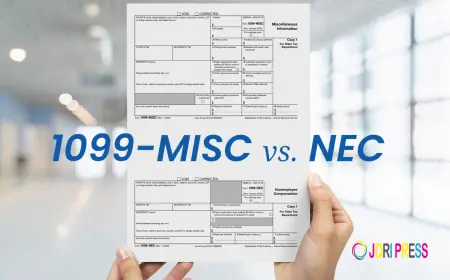Global Electric Farm Tractor Market 2030F Share Report
Electric farm tractors offer significant cost savings in terms of fuel and maintenance. Unlike traditional tractors that rely on fossil fuels, electric tractors are powered by electricity, which is typically cheaper than diesel or petrol.

Introduction
The agricultural sector is at the forefront of a global transformation, as sustainability, efficiency, and technological innovation reshape farming practices. Among the many advancements driving this evolution, the adoption of electric farm tractors has emerged as a game-changer. Farmers, policymakers, and equipment manufacturers are increasingly turning to clean energy solutions to reduce carbon footprints, minimize operating costs, and improve productivity.
According to industry assessments, the Global Electric Farm Tractor Market was valued at USD 178.31 million in 2024 and is projected to reach USD 337.13 million by 2030, growing at a CAGR of 11.20% during the forecast period. This steady growth is underpinned by advancements in battery technology, supportive government initiatives, and the agricultural sector’s commitment to environmentally friendly practices.
Electric tractors are no longer considered futuristic prototypes; instead, they are becoming integral to sustainable agriculture. Their adoption signifies more than just a technological upgrade — it represents a paradigm shift toward smarter, greener, and more efficient farming.
Emerging Trends in the Electric Farm Tractor Market
1. Sustainability-Driven Adoption
The most defining trend in the electric farm tractor market is the shift toward sustainability. With rising global concerns over climate change, farmers are under increasing pressure to reduce greenhouse gas emissions. Electric tractors provide a viable solution, enabling farms to operate with zero tailpipe emissions while still meeting the demands of modern agricultural practices.
2. Smart Agriculture Integration
The integration of digital technologies and precision farming tools is enhancing the appeal of electric tractors. These machines are now being equipped with:
- GPS navigation systems for improved field accuracy.
- Autonomous driving features for labor efficiency.
- IoT-enabled sensors for real-time monitoring of soil, weather, and crop health.
This convergence of clean energy and data-driven agriculture is redefining productivity standards.
Download Free Sample Report: https://www.techsciresearch.com/sample-report.aspx?cid=28688
3. Advancements in Battery Technology
Battery performance is central to the success of electric tractors. Recent progress in lithium-ion batteries has increased energy density, reduced charging times, and extended operational hours. Manufacturers are also exploring solid-state batteries to further enhance safety, lifespan, and efficiency.
4. Government Incentives and Subsidies
Governments worldwide are actively supporting the transition to electric agricultural machinery through:
- Tax incentives.
- Subsidized financing.
- Grants for rural charging infrastructure.
This policy-driven support lowers the adoption barrier and encourages farmers to embrace electric alternatives.
5. Shift Toward Autonomous and Shared Farming Equipment
Beyond electrification, autonomous tractors are gaining momentum. In some markets, farmers are also exploring equipment-sharing models, where electric tractors are leased or rented, allowing small-scale farmers to benefit from advanced technology without high upfront costs.
Market Drivers
The electric farm tractor market is powered by several key drivers that reflect both economic and environmental imperatives.
1. Rising Fuel Prices
Volatile fuel costs make diesel-powered tractors increasingly expensive to operate. Electric tractors provide long-term savings by reducing dependency on fossil fuels and offering stable operating expenses.
2. Environmental Concerns and Regulations
Stricter environmental regulations globally are compelling farmers to adopt low-emission technologies. Electric tractors directly address this need, aligning with international carbon reduction targets.
3. Lower Total Cost of Ownership (TCO)
Although the initial purchase cost of electric tractors remains high, the long-term operational savings in terms of reduced fuel, lower maintenance, and fewer mechanical breakdowns significantly enhance their financial appeal.
4. Technological Advancements
Innovations in power electronics, drivetrains, and telematics have improved the efficiency of electric tractors. Enhanced charging infrastructure is also contributing to wider adoption, even in rural and remote areas.
5. Labor Shortages and Mechanization
Many countries, particularly in Asia-Pacific, face labor shortages in agriculture. Electric tractors, often integrated with autonomous driving capabilities, help address this gap by reducing reliance on manual labor.
6. Consumer Demand for Sustainable Food Supply Chains
End consumers increasingly value sustainability in the food supply chain. Farmers using electric tractors not only comply with regulations but also gain a competitive advantage in eco-conscious markets.
Industry Key Highlights
- Market Valuation: USD 178.31 million in 2024, projected to reach USD 337.13 million by 2030.
- Growth Rate: CAGR of 11.20% (2025–2030).
- Dominant Segment: Battery-electric tractors lead due to improvements in battery efficiency and charging infrastructure.
- Regional Leader: Asia-Pacific, with India and China spearheading adoption, driven by large-scale agriculture and supportive policies.
- Technology Adoption: Integration of AI, automation, and IoT in electric tractors is reshaping modern farming.
- Sustainability Goals: Strong government incentives align market growth with global carbon neutrality targets.
Market Segmentation Overview
- By Capacity
- <50 kWh (small-scale farming)
- 51–100 kWh (mid-range farms)
-
100 kWh (large-scale farming and heavy-duty use)
- By Drivetrain
- Hybrid Electric
- Plug-in Hybrid Electric
- Battery Electric (leading the segment)
- By Region
- North America: Driven by precision farming adoption.
- Europe: Strong policy push for low-emission farming.
- Asia-Pacific: Fastest-growing region with large-scale adoption in India and China.
- Rest of the World: Emerging adoption in Latin America and Africa.
Future Outlook
The future of the electric farm tractor market is both promising and transformative. Over the next decade, we can expect:
- Mainstream Adoption: Electric tractors will move from early adoption to mainstream use, particularly in developed agricultural economies.
- Integration with Renewable Energy: Farms will increasingly power tractors through solar panels and on-site renewable energy systems, creating a closed-loop sustainable cycle.
- Autonomous Farming Growth: Driverless tractors powered by electric drivetrains will dominate large farms, reducing labor costs and increasing precision.
- Cost Decline: As battery prices continue to fall, electric tractors will become more affordable for small and mid-sized farmers.
- Global Policy Alignment: More countries will mandate or incentivize zero-emission farm machinery as part of broader sustainability strategies.
Competitive Analysis
The electric farm tractor market is highly competitive, with both traditional agricultural machinery giants and innovative startups vying for leadership.
Key Players:
- Deere & Company – Leveraging its strong global presence and innovation pipeline to integrate smart farming tools with electric tractors.
- Kubota Corporation – Focused on compact tractors, especially for small-scale farmers in Asia and Europe.
- CNH Industrial – Investing in hybrid and battery-electric models for large-scale farming.
- AGCO GmbH – Developing precision farming solutions integrated with electrified machinery.
- Monarch Tractor – A pioneer in fully electric, autonomous tractors, appealing to modern and sustainable farms.
- Solectrac Inc. – Known for environmentally friendly tractors aimed at small and medium farmers.
- Sonalika – Expanding rapidly in emerging markets like India with affordable electric models.
- Yanmar Holdings & Motivo Engineering – Innovating with hybrid-electric solutions for versatile farming applications.
Competition is driving innovation in battery efficiency, automation, and cost optimization, ensuring the market continues to expand rapidly.
10 Benefits of the Research Report
- Comprehensive Market Analysis: Provides detailed insights into size, share, and growth forecasts.
- Strategic Decision-Making Tool: Helps stakeholders evaluate investment opportunities.
- Identification of Emerging Trends: Highlights upcoming technologies and business models.
- Competitive Landscape Overview: Detailed profiles of leading players and their strategies.
- Regional Insights: Breaks down growth opportunities across different geographies.
- Policy and Regulation Mapping: Tracks government incentives and compliance frameworks.
- Consumer Behavior Analysis: Understands shifting farmer preferences toward sustainability.
- Risk Assessment: Identifies challenges such as infrastructure gaps and high costs.
- Innovation Tracking: Covers advancements in battery technology and autonomous farming.
- Customizable Insights: Tailored analysis to meet specific business requirements.
Conclusion
The Global Electric Farm Tractor Market represents one of the most significant shifts in modern agriculture. Driven by sustainability goals, rising fuel prices, technological progress, and supportive government policies, the market is set for substantial expansion by 2030. While challenges such as high upfront costs and infrastructure limitations remain, the long-term benefits in terms of lower operating costs, reduced emissions, and improved efficiency are undeniable.
As agriculture continues to embrace electrification and automation, electric farm tractors will no longer be niche alternatives but essential components of a sustainable, future-ready farming ecosystem. The convergence of clean energy, digitalization, and smart agriculture will ensure that the market not only grows but also fundamentally transforms the way food is produced worldwide.
Contact Us-
Mr. Ken Mathews
708 Third Avenue,
Manhattan, NY,
New York – 10017
Tel: +1-646-360-1656
Email: [email protected]
Website: www.techsciresearch.com
What's Your Reaction?
 Like
0
Like
0
 Dislike
0
Dislike
0
 Love
0
Love
0
 Funny
0
Funny
0
 Angry
0
Angry
0
 Sad
0
Sad
0
 Wow
0
Wow
0

















































